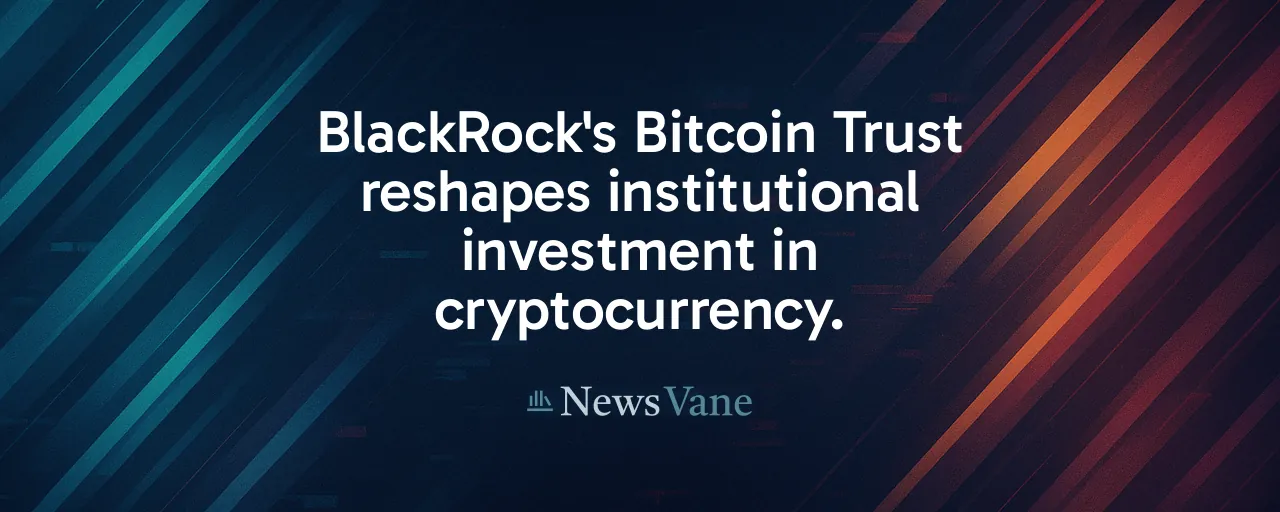A New Era for Bitcoin Investment
BlackRock's iShares Bitcoin Trust, known as IBIT, has redefined cryptocurrency investment. Holding 696,874 Bitcoin valued at $74 billion, it's the largest institutional Bitcoin holder and the fastest-growing exchange-traded fund ever. Launched in January 2024, IBIT's rapid rise reflects surging demand for regulated crypto exposure. Its success stirs complex questions about financial access, market stability, and environmental impact.
IBIT's ascent signals a broader shift. Digital assets are now central to portfolios, moving beyond being a fringe investment. Pension funds, like Wisconsin's SWIB, and even BlackRock's own multi-asset funds now hold stakes. The speed of these inflows, outpacing many tech stocks, demands a closer look at what this means for investors and the planet.
Why Bitcoin ETFs Matter
Spot Bitcoin ETFs like IBIT make owning cryptocurrency simpler. They hold actual Bitcoin, tracking its price directly, unlike futures-based funds that can lag. For retail investors, this means regulated access without the hassle of private wallets or unregulated exchanges. Institutional players, from endowments to insurance firms, also gain a secure entry point, driving IBIT's assets past $70 billion in under a year.
But convenience comes with trade-offs. Bitcoin's price swings, often exceeding 50% in a year, test investor resilience. Studies show a small 1-5% allocation can boost portfolio returns, yet volatility spikes too. The question extends beyond profits, focusing on whether everyday investors understand the risks in this fast-moving market.
The Environmental Cost of Crypto
Bitcoin's energy use is a growing concern. Mining, the process securing the network, consumes power rivaling small nations. Environmental groups argue this clashes with global climate goals. IBIT doesn't mine Bitcoin, but its holdings tie to the broader ecosystem, amplifying debates about sustainability.
Solutions exist. Some miners use renewable energy, and research explores greener consensus mechanisms. Requiring ETFs to disclose mining-related energy sources could bridge investor access with environmental responsibility, ensuring the crypto boom doesn't overheat the planet.
Navigating Market Risks
Large ETF flows can sway Bitcoin's price, impacting miners and hardware markets. If prices soar, capital gains taxes rise, but a crash could shake confidence. Historical data shows Bitcoin's correlation with stocks varies, low over time but tight during crises. This financialization ties crypto closer to traditional markets, for better or worse.
Regulators face a balancing act. The SEC and CFTC are tasked with aligning to prevent manipulation without stifling innovation. Clear rules, like limiting leverage in crypto products, could protect retail investors while preserving market freedom. The 2023 court ruling against the SEC's ETF rejections shows oversight needs coherence.
Lessons From the Past
Bitcoin ETFs aren't new territory entirely. The SPDR Gold Shares ETF, launched in 2004, turned gold into a financial staple. IBIT follows a similar path, making Bitcoin accessible but less decentralized. Early ETF proposals in 2013 failed due to manipulation fears, but BlackRock's 2023 filing, backed by its regulatory clout, changed the game.
This history suggests regulation evolves with market maturity. Today's challenge is ensuring ETFs don't concentrate Bitcoin in institutional vaults, eroding its original ethos. Balancing self-custody options with regulated products keeps choice alive for all investors.
Building a Fair Framework
A balanced approach starts with modest portfolio limits, like 1-2% in Bitcoin ETFs, to manage volatility. Mandating renewable-energy disclosures for mining tied to ETF holdings addresses environmental concerns. Unified SEC-CFTC oversight can curb fraud while fostering innovation.
Choice matters too. Investors benefit from options, including self-custody, trusts, or ETFs, without heavy-handed restrictions. This respects Bitcoin's roots while integrating it into modern finance, ensuring access doesn't come at the cost of fairness or sustainability.
Looking Ahead
IBIT's rise marks a turning point. It's proof crypto is here to stay, but its growth demands responsibility. Investors, regulators, and advocates are urged to work together to ensure this new frontier benefits all without destabilizing markets or the environment.
The path isn't simple, but clarity is emerging. By prioritizing transparency, measured exposure, and sustainable practices, the financial world can harness Bitcoin's potential while addressing its risks. The stakes are high, and the time to act is now.
As Bitcoin ETFs reshape investing, the focus remains on creating systems that are open, fair, and built to last. This moment offers a chance to redefine how digital assets fit into a rapidly changing world.
